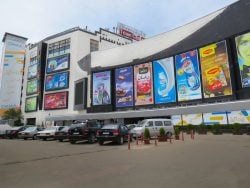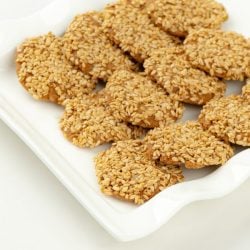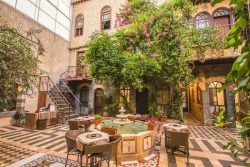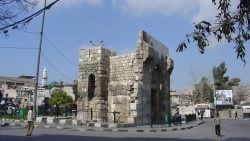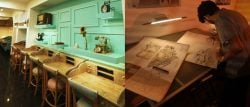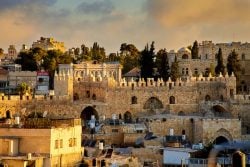5 Iconic Cafés Every History Buff Needs to Visit
In Damascus, cafes have never been just about sipping coffee or tea; they’ve always been a hub for stories, conversations, and politics. Let’s dive into the tales behind some of Damascus ‘s most iconic historic cafes.
Al-Nawfara Cafe:

One of the oldest historic cafes in Damascus, Al-Nawfara has been around for over 500 years. Nestled next to the Umayyad Mosque in Old Damascus, it’s named after a nearby fountain. Until recently, it was one of the last places where you could still catch a traditional storyteller, or “hakawati,” narrating epic tales like those of Antar and Abu Zayd Al-Hilali in that unique, dramatic Damascene style.
Al-Rawda Cafe:


Opened in 1938 at the end of Al-Abed Street, near the Salihiya Gate facing the parliament, Al-Rawda quickly became one of Damascus ’s most famous historic cafes. It has long been a gathering spot for intellectuals, artists, and politicians. It has witnessed countless discussions that have shaped the cultural and political landscape of Syria.
Khabbini Cafe:

Khabbini’s name harks back to the Ottoman era. Back then, young men would hide there to avoid conscription by the Ottoman army. The cafe’s tucked-away location at the end of a narrow alley made it a perfect hideout. Over time, Khabbini became a must-visit for anyone wandering through Old Damascus.
Al-Kamal Cafe:

Situated between Kindi Cinema and Joudat Al-Hashimi School, Al-Kamal Cafe has played a significant cultural role throughout history. It’s one of the few cafes that offer a unique take on tea—served “khmir” style, with fermented tea and boiled water. The cafe features a large open-air section for summer and a covered area for winter. The bonds between the cafe’s regulars and its staff are so strong, that they’re almost like family.
Havana Cafe:

Founded in 1945, Havana is one of Damascus’s most famous cafes, especially during the 1950s and 60s. It was a meeting place for intellectuals, politicians, and artists, known as a center of intellectual and cultural movements in the city. Havana saw countless discussions on literature, politics, and art. It was frequented by prominent figures like Nizar Qabbani, Adonis, Muhammad al-Maghut, and Zaki al-Arsuzi.
Damascus ’s historic cafes are not just spots to enjoy coffee. They are a vibrant part of the city’s heritage and social life. Each cafe has its own story, and every corner tells a tale of the long history of meetings, conversations, and debates that have left their mark on our past and present.
